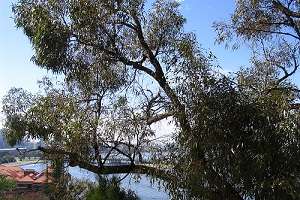Local eucalypts resist crossbreeding with introduced species

Botantists recently conducted a study in Perth's Kings Park and Bold Park to ascertain if indigenous Eucalyptus trees are under threat due to hybridisation with introduced species.
Leading the research is Kings Park Botanic Gardens and Park Authority expert Siegy Krauss.
Dr Krauss says the exploration began when it was suggested that much of the seed of tuart (Eucalyptus gomphocephala DC., Myrataceae) in Kings Park could be of hybrid origin, largely due to the introduction of eastern Australian species such as Eucalyptus Cladocalyx.
"The objective of the research was to rigorously quantify the true extent of hybridisation in tuart seed in the two parks using genetic molecular markers," he says.
Prior research has shown that reproductive barriers between Eucalyptus species can be weak.
However, genetic analyses by the botanists have concluded that in fact hybridisation between the local tuart (E gomphocephala) and non-indigenous species proves not to be a current conservation management issue.
"The research in fact showed that introduced species, growing into bushland is a far greater conservation management issue as they become invasive and in this context are considered weeds," Dr Krauss says.
Tuart trees are endemic to WA's Swan Coast Plain and are already under threat from agriculture, urbanisation and grazing.
The invasion of introduced species can take over an area making it more difficult for local eucalypt varieties to thrive.
The research involved genotyping 220 open-pollinated tuart seedlings from 19 families.
"A hybrid-index analysis of seedling genotypes showed no significant evidence for hybridisation and no alternative species private alleles were found in any tuart offspring genotypes in either King's Park or Bold Park," Dr Krauss says.
The research allowed the botanists to quantify the risk posed by the threat of hybridisation in tuart trees in a modified urban landscape.
"Results showed no private alleles of the alternative species were observed in the tuart progeny, indicating that hybridisation frequencies are most likely to be zero," he says.
"Rather, the invasion of pure non-indigenous species such as E. cladocalyx represents more of a conservation management problem.
"This is of concern as it can result in a decline or extinction of local species.
"Our study has not only strongly rejected suggestions of interspecific hybridisation but has also failed to confidently identify a single hybrid in Kings Park and Bold Park.
"This was a surprising find but a most welcomed one," says Dr Krauss.
The research has helped botanists to establish a clearer management priority in preserving the genetic integrity of local species and bushland.
Provided by Science Network WA


















